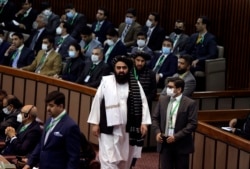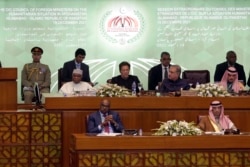A daylong emergency conference of the 57-nation Organization of Islamic Cooperation (OIC) agreed Sunday to set up a humanitarian trust fund to address the unfolding humanitarian and economic catastrophe in Afghanistan, where millions face hunger and an estimated 1 million children are at risk of dying of severe acute malnutrition.
The fund would be established under the Islamic Development Bank to channel relief aid to Afghans in coordination with other international partners, said a final statement from members at the Pakistan-hosted meeting. It included delegates from the United States, China, Russia, the European Union and the United Nations.
The conference marked the biggest international gathering on helping Afghanistan since the Taliban seized power from the Western-backed government in August following a U.S.-led foreign troop exit after 20 years.
Earlier, Taliban acting Foreign Minister Amir Khan Muttaqi assured the OIC gathering that their government would do more to enhance national political inclusivity and promote human rights, including those of women. The Taliban released the text of Muttaqi’s speech to the closed-door session.
“We stand ready, as a member of a single family, to listen to and accept all requests, concerns and advice of Islamic countries in relation to Afghanistan that can lead toward a proper and just roadmap and direct us out of the current crisis,” Muttaqi said.
“We consider human rights, women’s rights and participation by all capable Afghans from various regions our duty. We have done much in this regard and will continue to take further steps,” he added.
The chief Taliban diplomat renewed his government’s counterterrorism assurances, saying no one would be allowed to use Afghan soil against any country.
Washington and Western allies have blocked the Taliban’s access to about $9.5 billion in Afghan assets, mostly held in the U.S. Federal Reserve, imposed financial sanctions and halted non-humanitarian assistance to the war-ravaged country’s largely foreign aid-dependent economy.
Muttaqi again demanded the unfreezing of assets and removal of sanctions, saying they “have led to health, education and social services teetering on the brink; all of this has only harmed the general public."
The U.S. and other countries have cited concerns about terrorism and waning human rights, especially those of women, for refusing to directly engage with the Taliban. Those concerns stem partly from the previous Taliban regime from 1996 to 2001, when girls were prevented from receiving an education, and women from leaving home unless accompanied by a close male relative.
Taliban leaders repeatedly have promised their new administration will not bring back the harsh policies of their previous rule. Most Afghan girls across the country, however, are still not allowed to return to school and most female government employees have been barred from resuming their professional duties.
The Islamist group has yet to include a woman in the Cabinet since announcing its government in September.
Pakistan’s Prime Minister Imran Khan, while inaugurating the OIC summit, warned that the humanitarian disaster unfolding in Afghanistan could turn into “the biggest man-made crisis” unless the world urgently takes remedial steps. He called for the U.S. to unconditionally end sanctions on Kabul and unfreeze the assets in favor of facilitating humanitarian assistance to Afghans.
“I speak to the United States specifically; they must delink the Taliban government from the 40 million Afghan citizens even if they have been in conflict with the Taliban for 20 years,” the Pakistani leader said. “But this is a question of the people of Afghanistan, 40 million human beings.”
“Unless action is taken immediately, Afghanistan is heading for chaos. … But chaos suits no one. It certainly does not suit the United States,” Khan said. He added that chaos would benefit transnational terrorists linked to Islamic State and mean more refugees heading toward Pakistan, which already hosts 3 million Afghan refugees.
The frozen assets and abrupt suspension of aid are said to have exacerbated Afghan economic upheavals and increased humanitarian needs in the country where U.N. officials say 23 million people are already facing hunger due to years of war, a severe drought and high levels of poverty.
“We collectively feel that we have to unlock financial and banking channels because the economy cannot function and people cannot be helped without banking services,” Pakistani Foreign Minister Shah Mehmood Qureshi told reporters together with the OIC secretary general, Hissein Brahim Taha, after the meeting.
U.S. Special Representative for Afghanistan Thomas West attended the summit.
“A productive OIC session today with important outcomes -- not least the creation of a humanitarian trust fund and the naming of an OIC Special Envoy,” West tweeted. “The U.S. warmly welcomes the OIC’s role and contributions.”
The special envoy is tasked to follow up on the implementation of the OIC resolution adopted at Sunday’s meeting, particularly regarding coordinating efforts for the supply of humanitarian assistance to the Afghan people.
He described it as a “timely and important initiative” in a tweet after landing in Islamabad on Saturday.
“While we continue clear-eyed diplomacy with the Taliban -- on human rights, terrorism and educational access, among many other issues -- the Afghan people will remain at the center of our considerations,” West tweeted on Saturday.
Qureshi described the U.S. envoy’s speech to Sunday’s closed-door session of the OIC huddle as very hopeful in terms of facilitating the urgent relief assistance to Afghans.
West “said that he has a clear mandate from his boss, Secretary [of State Antony] Blinken, to engage with the Taliban and he has met the Taliban delegation on the sidelines over here,” Qureshi said. “I am sure they (the Taliban) were sensitized to the expectations of the international community.”
The Pakistani chief diplomat quoted West as telling the meeting the U.S. has decided not to make humanitarian assistance conditional.
“He also said, and this is quite hopeful, that there is an amount unutilized with the international financial institutions to the tune of $1.2 billon and now they can find mechanisms of utilizing that,” Qureshi added.
The sanctions and lack of diplomatic recognition of the Taliban government in Kabul have disrupted the Afghan banking system, undermining delivery of urgently needed humanitarian aid to those who urgently need it. Diplomats acknowledge facing the delicate task of channeling aid to the crisis-hit Afghan economy without also propping up the hardline Islamists.
U.N. humanitarian chief Martin Griffiths reiterated those concerns while addressing Sunday’s conference in Pakistan.
“Afghanistan's economy is now in free fall, and that if we do not act decisively and with compassion, I fear that this fall will pull down the entire population with it,” Griffiths warned.
Griffiths said health facilities are overflowing with malnourished children, some 70% of teachers are not being paid and millions of Afghan children are out of school, noting that prices of key commodities continue to rise.
The cost of wheat and fuel is up by around 40% and food now accounts for more than 80% of the average household expenditure.
Griffiths underscored the importance of “continued constructive engagement” with the Taliban government “in a process of meaningful dialogue to clarify what we expect of each other.”







